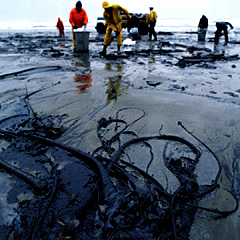News in a nutshell
| 14 June, 2010 | Adie Chan |
|

|
Hate NSF? Tell us
A new forum for improving the National Science Foundation is up, and already attracting attention from high-profile bloggers, such as DrugMonkey. Specifically, the forum asks “What problems have you had with NSF?” and “What creative solutions have you come up with to these problems?”
Fraud case settled
Lawsuits filed by Onconome Inc. in Redmond, Washington against researcher Robert Getzenberg for using millions in funding from the company to develop a prostate cancer biomarker that was “essentially as reliable as flipping a coin” were settled Friday for an undisclosed amount, according to ScienceInsider. The case against the University of Pittsburgh, where Getzenberg conducted the research that led to the diagnostic test, was dismissed, and two cases against Johns Hopkins University, where Getzenberg is currently on the faculty, have already been settled.
BP mops up spill news
 BP representatives — as well as local law enforcement, the Coast Guard, and government officials — are denying journalists access to the public areas affected by the massive oil spill, which continues to spew oil into the Gulf of Mexico. Scientists are also complaining about how little information BP and government sources are releasing, according to The New York Times.
BP representatives — as well as local law enforcement, the Coast Guard, and government officials — are denying journalists access to the public areas affected by the massive oil spill, which continues to spew oil into the Gulf of Mexico. Scientists are also complaining about how little information BP and government sources are releasing, according to The New York Times.
Even tougher COI rules?
As the National Institutes of Health near the implementation of their new financial conflict of interest rules, director Francis Collins is considering making a few revisions, according to The Chronicle of Higher Education — including ensuring that penalties against researchers remain in effect should they move to other institutions and potentially limiting rule-breakers

|


I am absolutely shocked to read the news in The Scientist that Onconome filed a lawsuit against Dr. Getzenberg, a Prof. at JHU, because his EPCA-2 test for cancer is as good as “flipping a coin.” I called Dr. Getzenberg from Barcelona where I was a visiting professor, as well as from CA, to discuss his paper that appeared in Urology, a respected journal where the conclusions were,”EPCA-2.22 assay had a 92% specificity (95% confidence interval 85% to 96%) for healthy men and men with benign prostatic hyperplasia and 94% sensitivity (95% confidence interval [CI] 93% to 99%) for overall prostate cancer.” I even boasted to my friends that, at last, there was a test which was unlike the normal psa test and could save people from having repeated unnecessary biopsy because of very high false positive. The Scientist story is too short and I wish Dr. Getzenberg will give out the full details as to what happened. Has Onconome repeated the test? Have they published the results? I’ll be interested to know.
Ken/Oxford University
Quote: I even boasted to my friends
Answer: You seem to be easily impressed and naive .. imho ..
Yes, I guess the word “boasted” was a bit exaggeration. Having said that, let me ask: did Tom or, for that matter, anyone else, ever raise any doubt about the paper that was published in a respected journal like “Urology?” If so, pls. let me know. Did anyone expect me to repeat all the tests that Dr. Getzenberg had done before I made my comments? What were the reviewers doing? Just signing off saying the paper can be published. I still maintain it is for Dr. Getzenberg to come out in the open and say publicly what exactly happened. Did he fudge his results? Or, did any of his postdoc do something that he was not aware of? Also, it is the duty of Onconome to publish in a peer-reviewed journal their results so that one could establish whether EPCA-2 test is as good as “flipping a coin.”